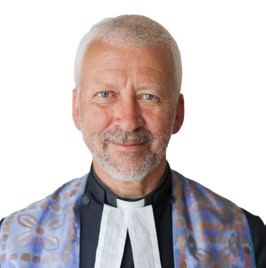‘We are all in it together’
The Rev Dr Richard Frazer reflects on charity and the Church of Scotland’s new growth fund.

The Rev Dr Richard Frazer
“YOU will be enriched in every way so that you can be generous on every occasion.”
St Paul wrote this to the church at Corinth.
Our calling as a Christian community is to live generously, so, what should that look like?
In our work at the Grassmarket Community Project, a part of Greyfriars Kirk’s ministry in Edinburgh, I have lost count of the volunteers and donors who have said to me: “I have got so much more out of this than I have given”. I have come to realise that the Gospel’s call is to work towards the blurring of the distinction between those who give and those who receive.
My experience has led me to challenge the traditional understanding of charity, a matter of donors and recipients. The rich person gives of their surplus to the person who does not have. It is a noble thing at one level, but I think that there is so much more to it than that.
A Jewish friend introduced me to the ancient idea of Tzedaka. It is not about donors and recipients. Instead, we are all in it together. It is about building a society of justice. You can give to a beggar on the street, but at the other end of the scale, you can take that person into partnership and build a fairer society together. You no longer have passive recipients of charity, but everyone contributes what they can to society’s wellbeing. Those who give of their surplus find their lives enriched and the poor are not ‘warehoused’ as though they have nothing to offer.
St Paul is suggesting that we should not be fearful of losing our wealth, for if we live generously, providence will enrich us as we contribute to the realm of Jesus, the Kingdom of God. “Bread for all before cake for anyone” was the way William Beveridge, architect of the Welfare State, put it.
One of the most far sighted and generous things that the Church of Scotland has done recently is to establish the £25m Growth Fund. It is a bold and generous act. I want to ask, is it enough to build up the Church of Scotland or do we want to extend the realm of Christ in our land? I would like to think that we would answer that question by affirming that the spiritual wellbeing of the whole people takes precedence.
I am aware that there is an ongoing debate within the Church about how we might prioritise the expenditure of this money. Some people want to establish new worshipping communities and some want to extend the Church’s contribution to community flourishing. Of course, I think we all want both and we should avoid a debate that would cancel one or the other out.
I think we should set up a governance team, independent of the Church, of people with expertise in the funding scene to oversee this and support the in-house management team in delivering it. Then, in addition, wouldn’t it be an act of generosity to open the fund to partner churches throughout Scotland, so that they could benefit too, especially if that were to support ecumenical co-operation and the spiritual renewal of our communities? Who knows, that may even prompt partner churches to contribute financially too? St Paul adds in his letter to Corinth:
“
One of the most far sighted and generous things that the Church of Scotland has done recently is to establish the £25 million Growth Fund."
“Through us your generosity will result in thanksgiving to God”.
The Growth Fund is an opportunity for us to re-imagine the spiritual life of the whole people of Scotland and the role that the Church of Scotland can play in our transformed, multi-cultural community, working with people of faith and goodwill everywhere to build a society that strives for justice and belonging for all.